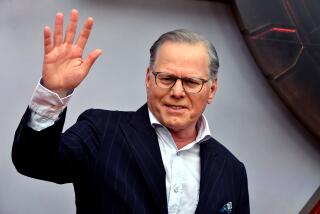Warner Bros.’ ‘misunderstood’ executive Jeff Robinov to soon enter spotlight as studio president
Jeff Robinov is the anti-mogul.
In an industry full of oversized personalities, he is a soft-spoken, austere and mercurial figure who works in an undecorated office and rarely smiles. Though his job depends on relationships, the president of the Warner Bros. motion picture group is uncomfortable with schmoozing, public speaking and filmmakers pitching ideas in person. And while many studio executives thrive on self-promotion, Robinov describes himself as “misunderstood.”
Yet by the end of this week, the 52-year-old will wield one of the most powerful tools in show business: final authority to say what movies get made and to manage the $2 billion to $3 billion allocated each year to make and market movies at Time Warner Inc.-owned Warner Bros. Robinov will inherit the “green light” from Warner’s president of 12 years, Alan Horn, who at 68 is being forced to retire Friday, making way for younger leadership.
Robinov is about to step into the spotlight he’s long tried to avoid. But he plans to do it on his own terms.
“I can’t apologize for who I am,” said the man who has as many detractors as fans inside Warner and throughout Hollywood.
He could ascend further. Starting next week, Robinov will join television president Bruce Rosenblum and home entertainment president Kevin Tsujihara in a new Warner Bros. “office of the president” that consults on strategic decisions. The trio are top candidates to replace studio chairman Barry Meyer when his contract ends in 2013. Time Warner Chief Executive Jeff Bewkes has made clear that he will not tolerate aggressive jockeying among the three.
Robinov faces challenges internally and in an industry grappling with declining DVD and box-office ticket sales amid seismic shifts in consumer behavior, particularly online. Warner has slashed spending on producer deals by about 25% and, like most of its competitors, cut the number of films it releases annually.
At the same time, Robinov, who closed Warner’s specialty movie labels in 2008 and infamously passed on releasing the Oscar-winning hit “Slumdog Millionaire,” wants to keep increasing the number of big-budget “tentpoles” that fuel global revenue.
His most immediate hurdle is filling the void that will be left this summer when the multibillion-dollar “Harry Potter” series shepherded by Horn ends. Robinov is betting on DC Comics characters to take center stage starting in June with the $200-million-plus production “Green Lantern.”
He’s then aiming to release new “Batman” and “Superman” films in 2012 and “Justice League,” a teaming of DC’s top heroes, in 2013.
Many agree that Robinov’s greatest strength is his willingness to take creative risks on ambitious movies — a rarity in a business that increasingly plays it safe. “I think what defines Warner Bros. is the filmmaker choices on our event movies,” he said.
The approach has brought commercial success and critical acclaim with edgy pictures such as director Christopher Nolan’s “The Dark Knight” and “Inception.” Nolan credited Robinov with persuading him to put a Batmobile in “Batman Begins” despite the movie’s ultra-realistic tone. “I feel like I can be honest about the film I am trying to make, and Jeff is honest about what the studio needs to make it happen,” Nolan said.
Robinov’s faith in certain filmmakers can go too far, some critics contend. This past weekend’s “Sucker Punch” was the third consecutive box-office disappointment for Zack Snyder at Warner since the 2006 hit “300,” prompting some fans to question his role as director of next year’s “Superman” reboot.
“All I could think of was how wrong of a choice this director is for a Superman film,” wrote a critic on the fan website Ain’t It Cool News.
But Robinov expressed no doubts. “If it’s a swing and a miss, you’ve got to take pride in the fact that we backed the level of vision,” he said.
Loyalty, said some who’ve worked with Robinov, is one of his best traits.
“Once Jeff makes you part of the Warner family, you can count on him supporting you through the ups and downs of the movie business,” said producer Dan Lin, who previously worked under Robinov as a production executive.
Guy Ritchie, who directed “Sherlock Holmes” and is working on a sequel, noted how rare it was to get feedback from a studio executive without intermediaries. He cited Robinov’s suggestion to lighten the music in “Sherlock.”
“If Jeff is uncomfortable with something,” Ritchie said, “he just calls me up.”
That blunt style, however, rubs some the wrong way. People who have unsuccessfully pitched Robinov movie ideas said he typically remains stone-faced, finishing meetings with little feedback and delivering bad news abruptly by phone.
Associates said Robinov also holds grudges and refuses to work with certain talent, such as “The Social Network” director David Fincher. The two clashed over creative differences on “Zodiac” and “The Curious Case of Benjamin Button.”
Inevitably, many industry insiders compare Robinov to his soon-to-be predecessor, Horn.
“Alan is more gregarious and easier to talk to,” said United Talent Agency partner Jeremy Zimmer. “Jeff is awkward and comfortable with long pauses. On the other hand, he’s unbelievably straightforward.”
Horn is a polished public speaker who has represented Warner at industry events and congressional hearings. When he skipped November’s premiere of “Harry Potter and the Deathly Hallows” in London, Robinov introduced the movie instead. People present said the nervous executive left the crowd squirming for more than 10 minutes, sometimes dropping the microphone to his side while talking.
Despite their differences, Robinov has been groomed by Horn, who promoted him to president of production in 2002 and five years later to his current post, in which he also oversees marketing and distribution.
“Vanilla and chocolate are as different as can be,” Horn said. “But nobody’s going to say which is better.”
Robinov will for the first time start answering to Meyer, who oversees all Warner Bros. business units.
“I know Jeff less well than some of the other executives,” Meyer said. “Now we’re going to have a more direct relationship.”
A native of Maine, Robinov worked in advertising in New York until he was 30, when he moved to Los Angeles to attend graduate school for producing. But after being wait-listed at UCLA, he started working for a talent manager, eventually becoming an agent and signing filmmaker clients such as the Wachowskis(the “Matrix” trilogy) and the Hughes Brothers (“The Book of Eli”). By 1997, when he became a Warner production executive, Robinov had a new career goal. “I wanted to run a studio,” he said.
Robinov was hardly an obvious choice to even get close to that goal given his personality and lack of financial experience.
“Ten years ago I might not have guessed we’d be here today, but Jeff has had a combination of good choices and good fortune,” said Bruce Berman, a former production president at the studio and head of its financing partner Village Roadshow Pictures.
Robinov’s first move upon his 2007 promotion was elevating Sue Kroll to a newly created post of worldwide marketing president. At Robinov’s request, the outgoing and energetic Kroll spends half of her week in an office next to his, often popping by to discuss projects.
“We don’t talk about it, but Jeff and I know we’re a good balance for each other,” she said.
A workaholic and self-confessed “control freak,” Robinov spends his little free time with his three children and exercising. He is also working with a consultant to improve his communications skills. One goal is to avoid checking his BlackBerry during meetings.
“I’m trying to relieve myself of an addiction,” he said.
Robinov’s detractors may see little hope that he will change. But others believe his elevated job presents an opportunity.
“I know the Jeff people see, but there’s a lot that they don’t see,” Kroll said. “As he evolves in this position, I want everyone to watch what he brings to the table and say, ‘Wow!’”
More to Read
Inside the business of entertainment
The Wide Shot brings you news, analysis and insights on everything from streaming wars to production — and what it all means for the future.
You may occasionally receive promotional content from the Los Angeles Times.










